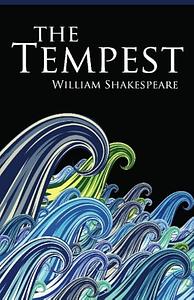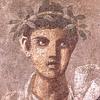You need to sign in or sign up before continuing.
Take a photo of a barcode or cover
funny
mysterious
medium-paced
Plot or Character Driven:
A mix
Loveable characters:
Complicated
adventurous
funny
hopeful
lighthearted
fast-paced
challenging
dark
funny
mysterious
Relectura con motivo de la asignatura de Ejes de la Literatura Inglesa y Medieval.
Tengo que confesar que The Tempest tiene un huequito en mi corazón porque pude verla representada en el Globe con Colin Morgan en el papel de Ariel y fue uno de mis mejores recuerdos, una experiencia maravillosa y por ello tengo un cariño y apego especial a la obra.
Por otro lado, desde mi punto de vista, es la obra con más elementos fantásticos de Shakespeare que he leído, tiene brujas, espíritus, magia, magos y conjuros. Y eso es algo que me encanta sobre todo porque creo que hace un gran contraste con sus obras históricas, y seamos sinceros, a mí si me pones brujas o fantasmas ya me tienes ganada casi de calle.
Es una obra muy cortita, incluso en comparación con sus otras obras y se lee muy rápido.
Eso sí, ahora que he leído más Shakespeare, y le he estudiado, mis gustos han cambiado un poco. Creo que de haber leído King Lear por ejemplo, años antes no lo habría disfrutado tanto como ahora. Y al tener más bagaje se que The Tempest me gusta por la implicación emocional que tengo con la obra más que porque me haya gustado en sí Pero eh, que sigue siendo una obra muy chachi. Y Prospero un liante manipulador de cuidado.
Tengo que confesar que The Tempest tiene un huequito en mi corazón porque pude verla representada en el Globe con Colin Morgan en el papel de Ariel y fue uno de mis mejores recuerdos, una experiencia maravillosa y por ello tengo un cariño y apego especial a la obra.
Por otro lado, desde mi punto de vista, es la obra con más elementos fantásticos de Shakespeare que he leído, tiene brujas, espíritus, magia, magos y conjuros. Y eso es algo que me encanta sobre todo porque creo que hace un gran contraste con sus obras históricas, y seamos sinceros, a mí si me pones brujas o fantasmas ya me tienes ganada casi de calle.
Es una obra muy cortita, incluso en comparación con sus otras obras y se lee muy rápido.
Eso sí, ahora que he leído más Shakespeare, y le he estudiado, mis gustos han cambiado un poco. Creo que de haber leído King Lear por ejemplo, años antes no lo habría disfrutado tanto como ahora. Y al tener más bagaje se que The Tempest me gusta por la implicación emocional que tengo con la obra más que porque me haya gustado en sí Pero eh, que sigue siendo una obra muy chachi. Y Prospero un liante manipulador de cuidado.
adventurous
funny
mysterious
reflective
fast-paced
Plot or Character Driven:
Character
Strong character development:
Yes
Loveable characters:
Complicated
Diverse cast of characters:
Complicated
Flaws of characters a main focus:
Yes
Like every Shakespeare play, I need to consume it twice before I can really parse what happened. I might go watch an actual production, I’d like to see it as well. But really loved Ian McKellan’s performance, of course.
Revising this up to five stars now, ironically after the exam. Ah well. But it was a fun ride, and the things to think about are always stellar (haha)
I haven’t read any Shakespeare since high school, probably, so this was a long time overdue. I was inspired to read The Tempest because of a certain scene in a video game, and I saw that it wasn’t too long—how bad could it be? Shakespeare seriously humbles my understanding of English vocabulary and wordplay. I did miss having the Folger edition with the page-facing commentary to help make sense of certain phrases or words, but I think in the end I got the main gist of it.
The plot begins in media res, and apparently you learn by the end that not much time has taken place in the course of the play. Of course the main questions are—who is this Prospero fellow and how will he effect his revenge? In that view, the ending was a bit lackluster, as it seemed fairly anticlimactic; Prospero’s fate at the end is a bit unclear as well, especially with the epilogue. (Or maybe I just didn’t understand it fully.)
The characters in this are enjoyable, more or less. I enjoyed Prospero’s antics with Ariel, though he did have a tendency to drone on and on with exposition… maybe that is why he was exiled? …I jest, of course. Still, any human with a fondness for books has my sympathy, if not my complete understanding. I would’ve liked more background and context for Prospero’s spirits and his magic powers, or even the lore about the previous witch and the island they are on—but these details are tossed through bits of exposition like sprinkles. Miranda and Ferdinand have a miraculous romance, by Shakespearean accounts, that doesn’t seem to end in immediate tragedy. (Though, really, falling in love and aiming for marriage in the span of a few hours is extremely questionable. And asking if the woman is a virgin first? Have some tact, man!)
I enjoyed reading some of the famous scenes and quotes that I’ve seen quoted countless times in literature, and of course, Shakespeare is a master with words and descriptions. Even if the expositions were boring, at least they were full of clever metaphors and beautiful diction. Though I’m really not sure what to make of the ending, and what the take-home message here was… I might have to sit and contemplate that a bit more. There are flickering themes of madness, revenge, inheritance, visions vs. reality, what exactly one is owed by others, and family, among others. I am sure this would be great to see performed. In any case, I need to read more Shakespeare, so I can grease that small section of my brain into better comprehension again.
The plot begins in media res, and apparently you learn by the end that not much time has taken place in the course of the play. Of course the main questions are—who is this Prospero fellow and how will he effect his revenge? In that view, the ending was a bit lackluster, as it seemed fairly anticlimactic; Prospero’s fate at the end is a bit unclear as well, especially with the epilogue. (Or maybe I just didn’t understand it fully.)
The characters in this are enjoyable, more or less. I enjoyed Prospero’s antics with Ariel, though he did have a tendency to drone on and on with exposition… maybe that is why he was exiled? …I jest, of course. Still, any human with a fondness for books has my sympathy, if not my complete understanding. I would’ve liked more background and context for Prospero’s spirits and his magic powers, or even the lore about the previous witch and the island they are on—but these details are tossed through bits of exposition like sprinkles. Miranda and Ferdinand have a miraculous romance, by Shakespearean accounts, that doesn’t seem to end in immediate tragedy. (Though, really, falling in love and aiming for marriage in the span of a few hours is extremely questionable. And asking if the woman is a virgin first? Have some tact, man!)
I enjoyed reading some of the famous scenes and quotes that I’ve seen quoted countless times in literature, and of course, Shakespeare is a master with words and descriptions. Even if the expositions were boring, at least they were full of clever metaphors and beautiful diction. Though I’m really not sure what to make of the ending, and what the take-home message here was… I might have to sit and contemplate that a bit more. There are flickering themes of madness, revenge, inheritance, visions vs. reality, what exactly one is owed by others, and family, among others. I am sure this would be great to see performed. In any case, I need to read more Shakespeare, so I can grease that small section of my brain into better comprehension again.
“Me, poor man, my library
Was dukedom large enough.”
“Hell is empty and all the devils are here.”
“Misery acquaints a man with strange bedfellows.”
“We are such stuff as dreams are made on, and our little life is rounded with a sleep.”
“O, brave new world
that has such people in't!”
adventurous
funny
mysterious





